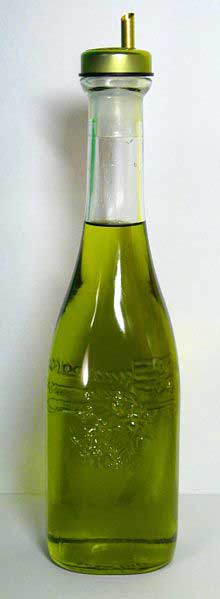Olive oil

Cooking with olive oil is like cooking with wine. Never use a wine or olive oil that does not taste good to you. An inferior one will leave an aftertaste. If you do the taste test and compare the "pure" to the "extra-virgin" and the you'll understand the difference.
When cooking with olive oil, save your extra-virgin expensive oils for salads, dressings, and vinaigrettes. You can also drizzle it over slices of crusty bread or onto open-face sandwiches. Use it on a baked potato or add it to mashed potatoes instead of butter. Extra virgin olive oil tastes great on cooked vegetables or brushed onto fish or meat before serving.
When sautéing or frying, use either a combination olive oil (one that is simply a blend of extra virgin and regular olive oil) or a straight olive oil.
Olive oil grading
The several oils extracted from the olive fruit can be classified in descending quality as:
- Extra-virgin olive oil comes from cold pressing of the olives, contains no more than 0.8% acidity, and is judged to have a superior taste. There can be no refined oil in extra-virgin olive oil.
- Virgin olive oil has an acidity less than 2%, and judged to have a good taste. There can be no refined oil in virgin olive oil.
- Pure olive oil. Oils labeled as Pure olive oil or Olive oil are usually a blend of refined olive oil and one of the above two categories of virgin olive oil.
- olive oil is a blend of virgin oil and refined oil, containing no more than 1.5% acidity. It commonly lacks a strong flavour.
- Olive-pomace oil is a blend of refined pomace olive oil and possibly some virgin oil. It is fit for consumption, but it may not be called olive oil. Olive-pomace oil is rarely found in a grocery store; it is often used for certain kinds of cooking in restaurants.
- Garlic olive oil is oil infused with garlic. Because of the risk of Talk:Garlic olive oil botulism it is not safe to make garlic olive oil at home.
Greek ΠΟΠ (POP) olive oil
There are several Greek olive oils which have been awarded ΠΟΠ (POP) ('Προστατευόμενη Ονομασία Προέλευσης’- Prostateuomeni Onomasia Proeleusis) status. Under the EU agricultural product quality policy, this "covers agricultural products and foodstuffs which are produced, processed and prepared in a given geographical area using recognised know-how". These oils include:
Italian DOP olive oil
There are several Italian olive oils which have been awarded DOP ('Denominazione d'Origine Protetta') status. Under the EU agricultural product quality policy, this "covers agricultural products and foodstuffs which are produced, processed and prepared in a given geographical area using recognised know-how". These oils include:
Spanish DOP olive oil
There are several Spanish olive oils which have been awarded DOP ('Denominación de Origen Protegida') status. Under the EU agricultural product quality policy, this "covers agricultural products and foodstuffs which are produced, processed and prepared in a given geographical area using recognised know-how". These oils include:
- Aceite Campo de Montiel
- Aceite de Bajo Aragón
- Aceite de la Alcarria
- Aceite de la Rioja
- Aceite del Baix Ebre-Montsià
- Aceite de Mallorca
- Aceite de Terra Alta
- Aceite Monterrubio
- Antequera
- Baena
- Gata-Hurdes
- Estepa
- Les Garrigues
- Montes de Granada
- Montes de Toledo
- Poniente de Granada
- Priego de Córdoba
- Sierra de Cádiz
- Sierra de Cazorla
- Sierra de Segura
- Sierra Mágina
- Siurana
Specialist olive oil suppliers
Whilst all supermarkets do sell a range of olive oil, there may be a time when you are looking for something a bit different. Please see our list of suppliers of olive oil. Find recipes that contain 'Olive oil'
#oliveoil #garlicoliveoil #frying #condiments #lesgarrigues #fish #montesdetoledo #storecupboarditems #kalamata #aceitedeterraalta #siurana